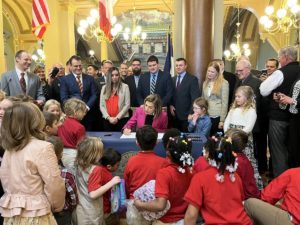Iowa Republicans propose scholarship program for students in private, public, or homeschool
(Mary Stroka | The Center Square) – Several Iowa Republicans proposed Tuesday a new scholarship program beginning in July 2023 for students in competent private instruction (homeschooling),…

(Mary Stroka | The Center Square) – Several Iowa Republicans proposed Tuesday a new scholarship program beginning in July 2023 for students in competent private instruction (homeschooling), private, and public schools.
Iowa Hope Scholarship Program funds could be spent on public school district services, tutoring facilities, university admission testing fees or preparatory classes, tuition and fees for programs that lead to credentials that satisfy workforce needs, nonpublic online learning programs, alternative education programs developmental therapies, or other qualified expenses.
Beginning in the 2023-2024 school year, Iowa students in private schools could be eligible for the program if they transferred from a public school or were in their junior or senior year at an accredited nonpublic school in the prior school year. Every fiscal year, eligibility would expand by two grades. In the 2029-2030 school year, students eligible to enroll in preschool through senior year enrolled in accredited nonpublic school for the prior school year would be eligible.
The Iowa Department of Management would distribute funding and establish rules for program participation and auditing procedures for the program. Students would need to apply by October 15 for the school year beginning July 1, 2023. The department would keep an updated, public list of participating education service providers. It could contract with a private organization, such as a financial management firm, to administer the program. The department would implement a commercially viable, cost-effective and parent-friendly system for payment for services from scholarship accounts and a system for publicly rating, reviewing, and sharing information about participating education service providers.
Students would receive the funding they would have received if they were enrolled in their residence’s school district multiplied by the difference between 88.4% of the regular program state cost per student and Iowa’s average foundation property tax per student. Students would also receive the per-pupil funding their residential school district provides for supplementing teacher salaries, professional development, early intervention, area education agency teacher salaries, area education professional development and teacher leadership.
The state’s general fund would provide funding for all approved scholarships and the costs of administering the program. No more than 5% of the annual appropriation to the scholarship fund could be used for administration costs and cost of surety bonds for education service providers receiving more than $100,000 annually in hope scholarship funds.
Students may receive funding unless they became ineligible or if their parents did not renew the scholarship. Parents may renew the scholarship annually. The funds deposited in students’ scholarship accounts would not be taxable income.
Rep. Skyler Wheeler, R-Orange City, vice chair of the Education Committee, told The Center Square in a texted statement Wednesday that the intention of the bill is to empower parents in their children’s education, including through financial means.
“Parents know what’s best for their children when it comes to where and how to educate them, and we should empower them to make the best decision they can,” Wheeler said. “The state of Iowa has an interest in funding students, not systems. This bill would provide full, real school choice for all of Iowa’s families.”
Wheeler said the Department of Management should be in charge because it’s an account-managing policy, rather than an education policy.
Rep. Steve Holt, R-Denison, a sponsor, told The Center Square in a texted statement Wednesday that he believes the bill is a wise use of taxpayer money.
“The better the education for the child in the proper environment, the more effective is the use of the taxpayer dollar, whether that be public or private or charter,” he said.
Holt said he’s willing to discuss whether the Department of Management or the Department of Education should administer the program.
“When we talk about empowering parents and families, this is the direction we want to go,” AFP State Director Drew Klein told The Center Square in an emailed statement Wednesday. “Ultimately, every Iowa student deserves the opportunity to pursue their education in the environment that meets their unique needs. Funding, therefore, should be as flexible as possible. This bill achieves that goal.”



